by timbaros
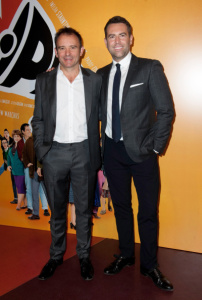 Pride took a long time to get to the screen. The actual events of the film took place between 1984 – 1985, however it was in 2012 when Producer David Livingstone met writer Stephen Beresford to commission the script for Pride. But the actual idea for the movie happened over 20 years ago.
Pride took a long time to get to the screen. The actual events of the film took place between 1984 – 1985, however it was in 2012 when Producer David Livingstone met writer Stephen Beresford to commission the script for Pride. But the actual idea for the movie happened over 20 years ago.
“I was having an argument with somebody, an argument which I imagine is replayed in gay bars across the world,” Stephen Beresford (Writer) said. “I was being told that gay men of my age weren’t as political as older gay men. and it was during a second round of the 1990’s, final round of pit closures, and we were talking about the miners, and I wasn’t in any way politically engaged with that question, I could not understand why I would be. And I said why would I support miners – they don’t support me. And the person I was speaking to said well here’s a story that may interest you, and he told me the story of LGSM. Personally, it’s what brought the film to life, really, from my perspective.”
Beresford added that “I’ve been trying to get people to make the film – I’d almost forgotten about it – I thought no one would ever make this film,” Beresford continues. “I think if they have, the answer that everyone gave was, those who were honest, was that it would be impossible to bring in a commercial audience, they would say it’s a great story why don’t you do a radio play or a drama documentary, something Channel 4 would do. And that was their attitude rather than I always thought what I wanted it to be was exactly what it’s turned into. I wanted it to be a big feature film, a mainstream feature film and treated in that way, with a director like Matthew Warchus, not a drama documentary or something like that. So I’d always rebuffed the attempts to diminish it because I just thought it was always a bigger story.”
In 1984 the UK’s National Union of Mineworkers began a nationwide strike in protest at planned coalmine closures around the country. The Thatcher government responded with measures that were not only tough, but frequently brutal. Among the many groups who supported the striking miners was a group of gay and lesbian activists in London who, following the Gay Pride march in the same year, they decided to raise money for the strike fund on the grounds that they had the same adversaries: the Thatcher government, the police and the tabloids. Calling themselves Lesbians and Gays Support the Miners (LGSM) and, unable to get their early donations accepted by the miners’ union, they set off in an old minibus to a remote village in Wales to hand over the money in person. So began an extraordinary tale of friendship and solidarity, following the events of a fraught 12 months during which LGSM became one of the biggest fundraisers in the whole of the UK.
So when Beresford started writing the film, how did he track down the original people the film is based on?
“They made a video called ‘Dancing in Delice’ which was available online and I watched it,” Beresford says. “There were no names on the screen when everyone was interviewed, so at the very end they had a thanks to card, and I just froze the frame, and I looked for any unusual names on it, and I cross-referenced them with Facebook. So there was Reggie Blennerhassett, and I thought there can’t be two of them in the world, and there aren’t, and I emailed him and said if he was involved with the Lesbian and Gays support the miners in 1984-85, and he was on holiday in France, two weeks later I got this message back saying ‘yes, this is the first time I have been asked this question in 30 years, what can you possibly want.’ …”
Was Warchus aware of the film as well?
Warchus says “not until I was sent the script and then just like a lot of people how could I have not heard about this.
There’s a great responsibility when we started making it and it was becoming a reality, these events really happened and all these people are alive, I met some of them through Stephen and it was it really sets the bar quite high when you feel like you owe it to these people to properly and effectively retell their story, so what I mean by that is that you don’t want to feel that you are exploiting them in any way. You want it to be delivered as an arrow when it flies straight as it possibly can. So Stephen made some modifications and changes to help the story tag, to deliver the impact. And I was conscious of balancing that myself, be authentic, be detailed, make it real, make it work, as well, without betraying anybody. So yeah, I think there was a big sense of responsibility, actually.”
One thing that is unique about Pride is that it is told through the eyes of the main character Joe (played by George Mackay), and not told through through the eyes of one of the LGSM members.
“No, because because if I was asked to do that, that’s just how I am interested, that’s what I like, what I’m interested in is the oblique” says Bereford. “There’s a wonderful, I don’t know who said it, and if you find you can credit them, somebody who said ‘Only what is seen sideways sinks deep’ – and I really feel that it’s very true and in way that’s precisely what Matthew’s saying about that tone, it’s the things that are just on the sidelines. So if I was asked to do a biopic of Attila the Hun, I would deliver a script about Attila the Hun’s hairdresser. And Attila would come in and out, see I am interested in the other people. So for me it could’ve never been about Mark Ashton (played by Ben Schnetzer) because then it would’ve been a very different story, it would’ve been a hero story, and hero stories don’t interest me. Why? Because I don’t think they are very funny. I was much more interested in the boy who’s staring at Mark Ashton thinking I will never be like that.”
Warchus added “And it’s another part of the brilliant script, is that amateurs, nobody’s experts at anything, they don’t know what they’re doing really, they’re all just making it up as they go along. That’s a wonderfully liberating radical encouraging expiring side of it as well, and of course it’s about groups, it has to be about groups of people. We were under some pressure to reduce the number of people in it, and in doing that for the sake, you take out all these characters you’ve got more chance of filming it on budget and on time, also you leave room for these characters, the guy character or another character to have more, to become more into the fore, tell us more about them.”
With such a large cast, the mood on the set must’ve been hectic but lots of fun. To this Beresford says:
“One of the things that people are surprised at is that when we started casting the film the casting director Fiona Ware and myself, and Stephen spent every audition together – the three of us – and then when we started shooting the film, Stephen sat next to me everyday for the shoot so I could ask him questions, we could talk about character things and lines and stuff like that but he’s also very very funny and so whereas I am very very dry so everybody’s spirits were up, everybody knew what they were there to do and I’d explained to everybody how we’re going to work, they understood how we’re doing it, why we’re doing it, there weren’t internal conflicts, everybody was doing the same thing to the same end, everyone’s spirits were up. It was hard work because we were doing it very very fast and many of the scenes were two takes, and it was everyday where we ran out of time, and just had to run and finish the lines, crazy, but it was, it always felt like we were doing the right thing somehow. It felt good, didn’t it.”
Warchus added “I think because of our traditions Matthew obviously has a very celebrated theatre career and that’s really what my background is, first as an actor and then as a playwright, so we both know the theatre and a lot of these actors also, that’s where they come from, and so there was something about it for us although everyone was horrified that we were trying to make this enormous thing, the gay & lesbian Ghandi on half the money and none of the time and people were freaking out, what we did is what you do in the theatre is when you’ve got no money and no time you say to the actors ‘we’ve got no money and no time’ – it’s a revolutionary idea that a lot of film people have never thought of. When you say to actors ‘listen, we only got time to do this, one set up and we might get another we might get a closeup but then we’ll see how we’re going , they say, OK, we won’t dick about, we’ll do our best, we’ll get it. And you work together in that way. So we had that sort of experience.”
In watching the film, you will notice that each character has his or her moment, so each one becomes familiar and as a group they really jell.
Beresford agrees. “I love the way Matthew directed it, and Tat Radcliffe, the cinematographer. One of the things I find most exciting about the film is that I love the feeling that the camera goes in this direction but what you two are doing is so interesting that if I just could get it over there we would have a whole other story.”
Warchus adds: “It makes it feel like the film’s not over, it hasn’t been scripted, it hasn’t been overdesigned, constructed, but it is realistic and life like.”
Pride is a very funny film, but it’s a very dramatic story, with the beginning of the AIDS crises. How did Beresford balance the humor and the drama?
“I know quite a lot about these sort of tonal things in a way, that’s what attracted me to the material, just being truthful because life is changing its tone, all the time. Don’t say I need this bit to definitely be that kind of thing and I’ve got to leave the audience to that thing and I got to make them feel that, uh, just make each thing on its own terms, truth and good, and effectively done, and then wait and see where the audience laughs, and where they don’t laugh, and what they do, and you can’t prescribe that, not until you actually set it out in front of people.”
And the choice of music is instrumental for a film like this because of the era in which the events happened. The mid-1980’s was full of great British music and the movie reflects this.
Warchus says “I was told to put songs in it as there wouldn’t be a way of selling it.”
Beresford added “when I was going through sort of thinking songs that might work – this was before we had Billy Bragg at the end – I found out six months before the film was greenlit, I was determined to end the film like that, even though when I mentioned it to any of the money people, you can see it written across their face there’s no way this film is ever going to end with Billy Bragg.”
“That’s an interesting resolve.” Warchus adds. “When I added Billy Bragg at the end I would go, hmmm, good, quite alright, then it was him in mind, he just wouldn’t communicate, it was so taciturn where this very beautiful school of music where Chris Nightingale (Composer) comes in under the track, you’ve got the choir which comes over the top of it and under the end of it, you know you’ve got your hands and knees on the floor, wracking sobs.”
Beresford continued “Yes, and that’s the point really, and once we found the songs that could be in it I would run them by Stephen and check and ask him his ideas what would be playing in a rubber club, I don’t know, Stephen however is an authority, ha ha ha, so he would help out there, but then Christopher Nightingale (Composer), the score’s another section that is where you can tell in the music that the Welsh end of the score has got a brass band and a Welsh harp in it, and the London end of things is more urban and electronic pop stuff. And that as you watch the film these two sonic worlds kind of intwine around each other as well, and that becomes kind of like the end, a resource to add Welsh music to Billy Bragg and superimpose them on top of each other. That side of things was an exciting, very exciting time because that’s when you put extra engines on the film, obviously, and the music goes without saying, and it was an experiment in how emotional things can get without being sentimental, it was all manipulation at that point, and so trying to hold on to the integrity to the film, but being brave enough to put your heart on your sleeve as well, Chris had a very very good instinct for that.”
Some of the songs in the film include:
Queen – I Want to Break Free
Bronski Beat – Why
Frankie Goes to Hollywood – Relax
Soft Cell – Tainted Love
Pet Shop Boys – West End Girls
Culture Club – Karma Chameleon
Grace Jones – Pull Up to the Bumper
Wham – Freedom
New Order – Blue Monday
Sylvester – Do Ya Wanna Fund
Billy Bragg – Power to the Union
The material in the film lends itself to an LGBT-themed film, a type of cinema that tends to be very niche.
Warchus says “I think part of the problem is that LGBT people are not visible throughout history often, so you have to dig them up to find them. It’s impossible to write a film, it’s not impossible, but it’s difficult to write a film set for example during the first World War in London without any women being involved even though women didn’t have the same equal rights at that time but there they are, they’ve got to be in the movie, where you wouldn’t think of the idea that any of these people might be an LGBT person. In a sense that’s sort of we have to dig up those stories and often they are very buried so I think that’s part of it. I just think this story happens to be about a particular event which is seminal and pivotal certainly in this country’s civil rights history but in a wider sense. I think it’s hard because people don’t automatically think in those terms even when they are creating characters I think.”
Beresford concluded “Also it’s not a niche, it’s not supposed to come out as a niche film, because this situation is anti-niche. It was about exploding but none of that matters as much as this. So you needed it to be the big thing thing which supercedes everything else and that’s why it works well.”
 The 58th BFI London Film Festival in partnership with American Express® starts today and promises big movies and even bigger stars.
The 58th BFI London Film Festival in partnership with American Express® starts today and promises big movies and even bigger stars.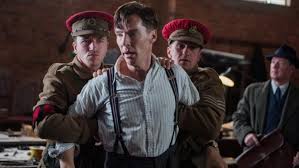



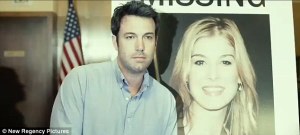 Sept. 29, 2014 – Went to a screening of the new Ben Affleck film ‘Gone Girl.’
Sept. 29, 2014 – Went to a screening of the new Ben Affleck film ‘Gone Girl.’ Maps to the Stars can be described as a take off on Hollywood and celebrity and the people who inhabit this world, and boy what a world it is.
Maps to the Stars can be described as a take off on Hollywood and celebrity and the people who inhabit this world, and boy what a world it is.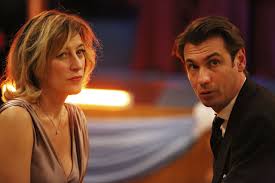 A cyclist gets mowed down by a car on an empty country road and it’s a mystery as to who did it. In the new film Human Capital, we are left guessing until the very end.
A cyclist gets mowed down by a car on an empty country road and it’s a mystery as to who did it. In the new film Human Capital, we are left guessing until the very end. Just last month Rolling Stone magazine named their 40 greatest rock documentaries of all time. Don’t Look Back – a documentary about Bob Dylan’s 1965 tour – was their number one. However, a new documentary about Nick Cave, called 20,000 Days on Earth, is now out at the cinemas, and will surely be amongst the top ten the next time Rolling Stone magazine compiles their list.
Just last month Rolling Stone magazine named their 40 greatest rock documentaries of all time. Don’t Look Back – a documentary about Bob Dylan’s 1965 tour – was their number one. However, a new documentary about Nick Cave, called 20,000 Days on Earth, is now out at the cinemas, and will surely be amongst the top ten the next time Rolling Stone magazine compiles their list.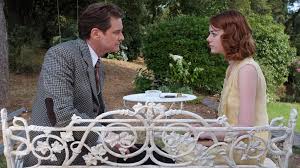 Woody Allen makes about one film every year. When his films are good, they are very good, and when they are mediocre, they are disappointing. His new film – Magic in the Moonlight – falls into the later category.
Woody Allen makes about one film every year. When his films are good, they are very good, and when they are mediocre, they are disappointing. His new film – Magic in the Moonlight – falls into the later category. Pride took a long time to get to the screen. The actual events of the film took place between 1984 – 1985, however it was in 2012 when Producer David Livingstone met writer Stephen Beresford to commission the script for Pride. But the actual idea for the movie happened over 20 years ago.
Pride took a long time to get to the screen. The actual events of the film took place between 1984 – 1985, however it was in 2012 when Producer David Livingstone met writer Stephen Beresford to commission the script for Pride. But the actual idea for the movie happened over 20 years ago.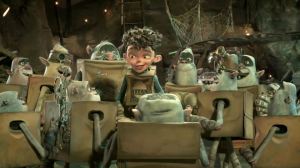 The Boxtrolls is being billed as a family event movie from the makers of 2009’s Coraline, a stop-motion 3D dark fantasy film. And The Boxtrolls is also dark, one of the darkest animated films to be released, since perhaps Coraline.
The Boxtrolls is being billed as a family event movie from the makers of 2009’s Coraline, a stop-motion 3D dark fantasy film. And The Boxtrolls is also dark, one of the darkest animated films to be released, since perhaps Coraline.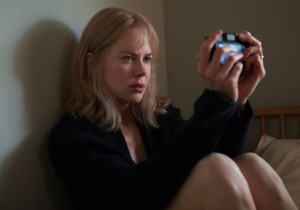 Christine wakes up everyday remembering nothing. She lives with a man who says he’s her husband, but she doesn’t remember him. One day she discovers the shocking truth about him, and the family she used to have, in the new film Before I Go To Sleep.
Christine wakes up everyday remembering nothing. She lives with a man who says he’s her husband, but she doesn’t remember him. One day she discovers the shocking truth about him, and the family she used to have, in the new film Before I Go To Sleep.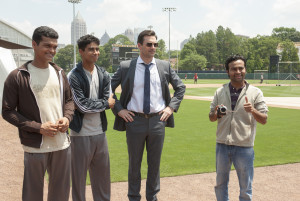 Two young men are plucked from their small Indian village to become major league baseball players in Disney’s newest feel good film Million Dollar Arm.
Two young men are plucked from their small Indian village to become major league baseball players in Disney’s newest feel good film Million Dollar Arm.
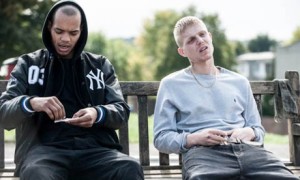 Do you want to watch a realistic, gritty film about UK gang culture? Then The Guvnors is just the film for you.
Do you want to watch a realistic, gritty film about UK gang culture? Then The Guvnors is just the film for you.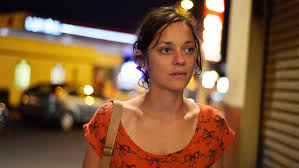 Marion Cotillard plays Sandra in Two Days, One Night (Deux Jours, Une Nuit), about a woman who is about to lose her job, and who also suffers from depression.
Marion Cotillard plays Sandra in Two Days, One Night (Deux Jours, Une Nuit), about a woman who is about to lose her job, and who also suffers from depression.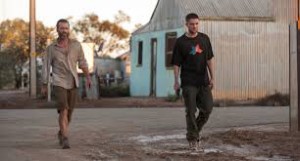 The Rover takes place in Australia ten years after a massive economic collapse, while two men travel together on a journey that takes them through dangerous territory, only to meet uncertain fate at the end.
The Rover takes place in Australia ten years after a massive economic collapse, while two men travel together on a journey that takes them through dangerous territory, only to meet uncertain fate at the end.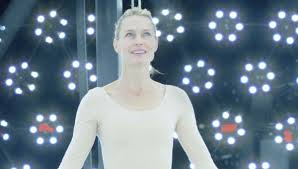 Expecting to see a political film, I was not prepared for what transpired on screen in the new film The Congress. It’s a mishmash of live action and animation that doesn’t make a whole lot of sense.
Expecting to see a political film, I was not prepared for what transpired on screen in the new film The Congress. It’s a mishmash of live action and animation that doesn’t make a whole lot of sense.





